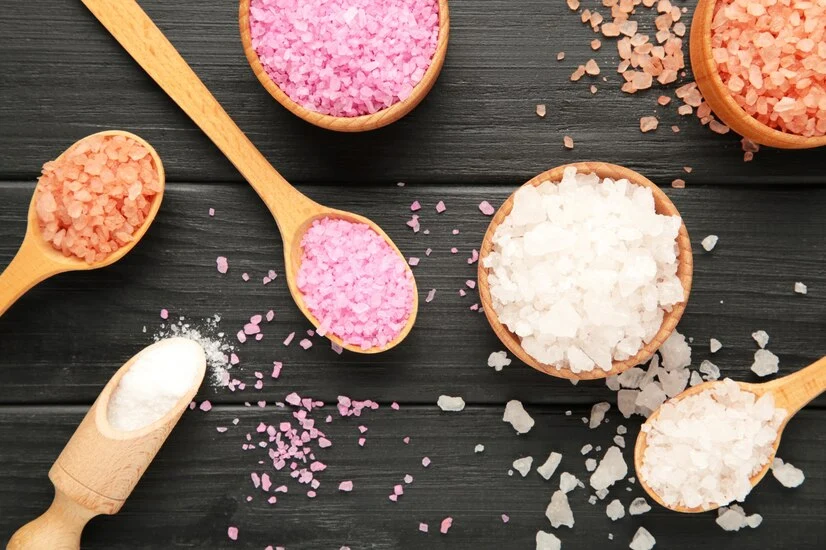
Celtic Salt | Health Benefits and Uses
- livewell
- August 21, 2024
- Noah Bennett
What is Celtic Salt?
Celtic salt, known as grey salt, is a culinary ingredient used for centuries. Its roots can be traced back to the Celtic people, who lived in coastal regions in France and Brittany. Celtic salt is well known because of its rich nutritional profile and distinctive flavor. Moreover, traditional methods were used to harvest it, preserving its nutritional profile and natural flavor. The use of conventional techniques for harvesting makes it a popular choice among chefs and nutritionists.
What Are The Characteristics Of Celtic Salt?
Some of the key features of Celtic Salt are:
Rich In Minerals
Celtic salt is famous because of its rich nutritional profile. It contains a rich variety of minerals. Celtic salt has trace minerals like magnesium, calcium, iron, and potassium. Additionally, these minerals not only give distinctive flavor but offer various health benefits as well.
Color
The trace elements and minerals in the harvesting environment, give the salt its gray color. These natural colors indicate that the salt is unprocessed. Moreover, it is also a sign of its purity and high quality.
Moisture and Texture
It has a coarse texture and holds some moisture content, which gives it a crunchy touch when consumed. Moreover, it adds an amazing taste to various cuisines, due to its texture and flavor. Furthermore, the moisture content helps prevent clumping and drying.
What Is The Difference Between Celtic Sea Salt vs Himalayan Salt?
Some of the differences between Celtic salt and Himalayan salt are as follows:
- The harvesters use traditional techniques to collect Celtic salt from the coastal areas of France and Brittany. They collect it from the seas and allow it to evaporate naturally. However, Himalayan salt is mined from salt deposits in the Punjab region in Pakistan. Millions of years ago evaporated seas from the Himalayan region formed Himalayan salt.
- Moreover, Celtic salt contains minerals such as magnesium, potassium, calcium, and sodium. Traditional techniques for harvesting give Celtic salt a moist texture. On the other hand, Himalayan salt is rich in minerals and trace minerals like iron, calcium, and magnesium. Additionally, iron oxide gives Himalayan salt a pink color.
- Celtic salt has a mild and briny flavor whereas Himalayan salt has an earthy and subtle flavor.
- Furthermore, Celtic salt is less processed and retains its moisture and minerals. On the other hand, Himalayan salt is also less processed but it is dried and ground into several textures.

Is Celtic Salt A Better Option Than Himalayan Salt?
It depends upon personal preferences and nutritional requirements. Both Himalayan and Celtic salt have rich nutrient profiles. However, Celtic salt has a more balanced nutritional profile. Moreover, the moist nature of Celtic salt makes it an excellent choice in various cuisines. They both offer several health benefits.
Furthermore, Celtic salt is a good choice, if you prefer a mild taste. On the other hand, if you want a robust flavor, Himalayan salt is a suitable option.
What is Celtic Salt Nutrition?
The nutritional profile of Celtic salt is:
- Sodium is around 380 to 420 milligrams.
- Potassium is in trace amounts.
- Magnesium is around 1 to 4 milligrams.
- Iron is in trace amounts.
- Calcium is in trace amounts.
What Are The Celtic Salt Health Advantages?
Besides adding delightful flavor to cuisines, Celtic salt has various health benefits. Some of them are as follows:
Benefits Due To The Presence Of Minerals
As already mentioned, Celtic salt is rich in minerals. The mineral content in Celtic salt has several benefits. For instance, magnesium in Celtic salt is good for muscle functioning and blood pressure regulation. Potassium promotes cardiovascular health and muscle functioning. Moreover, calcium helps strengthen the bone. Thus, these minerals provide various health benefits.
Electrolyte Balance
Celtic salt maintains electrolyte balance. This electrolyte balance helps keep a person hydrated. Moreover, it also ensures the smooth functioning of muscles. After exercises or workouts, it is crucial to maintain electrolyte balance, Celtic salt is a healthier alternative for maintaining electrolyte balance.
Aids in Digestion
Besides its culinary advantages, Celtic salt helps in digestion. Because of its abundance in minerals, Celtic salts help produce digestive enzymes. These digestive enzymes are crucial for breaking down food components efficiently. Moreover, it not only helps in digestion but also alleviates discomfort and bloating. So, incorporating Celtic salt into the diet supports good digestive health.
Healthy Skin
The minerals in it help improve appearance and also nourish the skin. Additionally, some individuals use it for detoxifying skin and reducing inflammation.
Moderate Sodium Content
Celtic salt has moderate sodium content compared to other highly processed table salt. This reduces the risk of heart disease. Moreover, it helps manage blood pressure.
Alkalizing Property
Celtic salt possesses alkalizing properties. It promotes an alkaline environment rather than promoting acidity. Additionally, pH balance is important for several bodily functions such as boosting the immune system’s performance and energy levels.
Better Respiratory Function
The steam using Celtic salt is beneficial for clearing the respiratory tract. Moreover, it reduces congestion. It also reduces the symptoms of respiratory disorders such as bronchitis.
What Are The Celtic Salt Uses?
Let’s discuss the uses of Celtic salt.
Final Touch
Choose Celtic salt to give a final touch to various cuisines. One can sprinkle it over the dishes before serving. Moreover, it makes the dish crunchy and enhances its flavor.
Brining
Celtic salt’s moisture content makes it an excellent choice for meat brining. Whether preparing a roast or grilled chicken, brining using Celtic salt enhances flavor and texture.
Cooking and Baking
Both baking and cooking involve the use of Celtic salt. Using Celtic salt for cooking and baking enhances flavor and nutritional profile.
Where to buy Celtic Salt?
You can buy Celtic salt from various places such as:
Online Retailers
Online retailers such as Amazon, iHerb, etc. sell Celtic salt.
Local Grocery Markets
Local grocery stores carry Celtic salt.
Directly from Manufacturers
You can directly buy Celtic salt from the manufacturers through their websites.

What Are The Potential Side Effects Of Celtic Salt?
Some of the potential side effects of excessive consumption of Celtic salt are:
Hypertension
Consuming excessive amounts of Celtic salt can result in increasing blood sodium levels, thus causing hypertension. Additionally, it increases the risk of heart-related disorders such as stroke.
Fluid Retention
Excessive consumption of Celtic salt can result in fluid retention. This results in inflammation of hands, feet, and other body parts.
Effect on Bones
Consuming excessive amounts of Celtic salt can cause an increased excretion of calcium in urine. Thus, negatively impacting bone health.
Effect on Kidneys
The excessive consumption of Celtic salt can strain kidneys. It exerts pressure on the kidneys to filter more sodium from the blood. Additionally, this results in kidney damage.
What Are The Tips For Mindful Consumption Of Celtic Salt?
Following are the guidelines for mindful consumption of Celtic salt:
- Consume Celtic salt in moderate amounts. The recommended daily amount is roughly one teaspoon.
- It’s important to incorporate several fruits and vegetables in your diet, to balance sodium intake. Moreover, this supports the overall well-being of an individual.
- If an individual has certain health conditions, he/she must consult the healthcare professional before consuming Celtic salt.
- Ensure you stay hydrated throughout the day. This allows for balancing sodium levels in the body.
- Choose high-quality Celtic salt from a reliable source.
- Pay attention to your body. If you face any issues stop the consumption of Celtic salt.
Conclusion
In conclusion, Celtic salt is a natural and nutrient-rich ingredient. It has various culinary benefits. Moreover, it offers several health advantages as well. The rich nutrient profile supports electrolyte balance, helps digestion, provides alkalizing effects, improves skin health, etc. The mindful use of Celtic salt enhances the flavor and taste of various dishes. Moreover, follow the guidelines for mindful consumption of Celtic salt to avoid negative effects. Thus, incorporating Celtic salt into your diet gives a flavorful taste and health benefits.
FAQ
Hello, What Can We Help You Find?
Are you looking for something? We are here to assist you. These are the questions
asked by our customers tell us yours.
The harvesters collect it from seawater using traditional techniques. Moreover, the harvesters don’t process it. Organic Celtic salt is valued because of its nutritional profile and environmentally friendly manufacturing techniques.
Yes, they both are the same.
It depends on personal preference. Celtic salt is a good choice, if you prefer a mild taste. On the other hand, if you want a robust flavor, Himalayan salt is a suitable option.
Celtic salt has several health benefits. It maintains electrolyte balance, aids digestion, improves skin health and respiratory functions, etc. Moreover, it enhances the flavor and nutritional profile of various dishes.
Consuming excessive amounts of Celtic salt can result in hypertension, exerting pressure on kidneys eventually leading to kidney damage, causing fluid retention, and negatively affecting bone health.
Consume Celtic salt in moderate amounts. Don’t consume Celtic salt without consulting your healthcare professional if you have underlying health conditions like hypertension, cardiovascular diseases, etc.
How to diagnose Dry Eyes Condition?
Hello! This is Customer Support
Feel free to contact us and we will provide you with information and guidance
Interesting Posts


Top Reasons to Invest in a Medical Alert System
November 29, 2024

Foods to Avoid While Aging
November 15, 2023

Tech for Seniors: How Smart Technology Revolutionize Seniors’ Life
October 20, 2023


Wherever the art of Medicine is loved, there is also a love of Humanity
- Hippocrates Tweet
Related Posts

Side Effects from Benzonatate You Need to Take Care of
August 4, 2025

Albuterol VS. Symbicort: Key Benefits and Risk Factors
June 26, 2025

Intense Bloating After Eating: What’s Really Happening?
June 26, 2025



